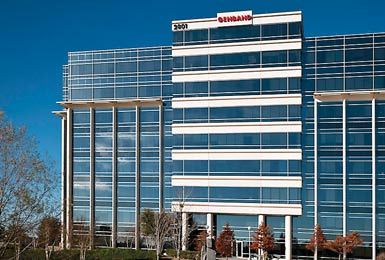By 1997, the little town located just 20 minutes north of Dallas had began to grow; 29,000 people called Frisco home, and Gandy joined the Frisco Economic Development Corporation (FEDC) as executive vice president. Along with other city partners, his team knew they had a golden opportunity to develop a highly promising region almost from the ground floor up.
Today, the now-wealthy Dallas suburb is situated in the booming growth corridor running along the Dallas North Tollway and Preston Road. All grown up, modern Frisco sparkles with eight million square feet of shopping, 15 day spas, 1,500 hotel rooms, four professional sports teams, and - most importantly - 9,000 businesses, which serve the needs of the 72-square-mile city's 121,380+ citizens (June 2011). Since 1991, FEDC's recruitment of more than 190 companies has resulted in more than 23,000 jobs, 23 million square feet of office space, and capital investment in excess of $2.7 billion . New major corporate citizens include Oracle USA, Genband, Sheplers, Ameriflex, and Associated Network Partners, Inc.
Along with explosive growth have come accolades. Last June, the U.S. Census Bureau identified Frisco as the number-one fastest-growing community in America among cities of 100,000 or more. Bureau data showed Frisco's 2009 population of 102,412 had grown 210 percent since the 2000 census counted 33,695 souls. Forbes.com named the city as one of the top 10 places to relocate (2009). And Money Magazine recognized the city as one of the top 100 places to live in the nation (2008) due to strong infrastructure, quality commercial developments, and exceptional leadership.
Why have people and companies flocked to Frisco?
- 1. Development plans - Gandy, now FEDC's president, says you can't underestimate the value of a comprehensive plan for a city. "It's critical to get everyone on the same page about where your city wants to go and how you're going to get there. Only 46 percent of Frisco is developed.and the population will top about 280,000 by build-out in maybe 20-some years. We constantly refer to the plan, as it has been highly responsible for what's been developed up to this point and leads to our future."
- 2. Unified leaders with updated plans - The city updates its plan every five years during a six-month process, says Gandy. New ideas are gleaned from public and private meetings, plus input from major stakeholders. "That process has enabled us to refine our vision of what we want Frisco to be when it fills out, and to stay on course with the plan." Gandy cites the excellent relationships formed between community partners as another reason companies give for locating here.
- 3. Quality-of-life differences - Many years ago city leaders decided Frisco should be developed in ways that would strongly differentiate it from neighboring cities. "We created a healthy, significant tourism industry by becoming a destination venue for youth, amateur, and professional sports," explains Gandy. "It brings people to Frisco, and benefits.the entire community."
- 4. Investment in education - Many people move to Frisco because of its quality education system. "Ours is the largest exempt school district in Texas, and it's been the fastest-growing school district in the nation for at least the past five years.Over half our residents 25 years or older have at least a four-year bachelor's degree, and our average age is 34. Companies are attracted to our young, well-educated, and skilled work force."



